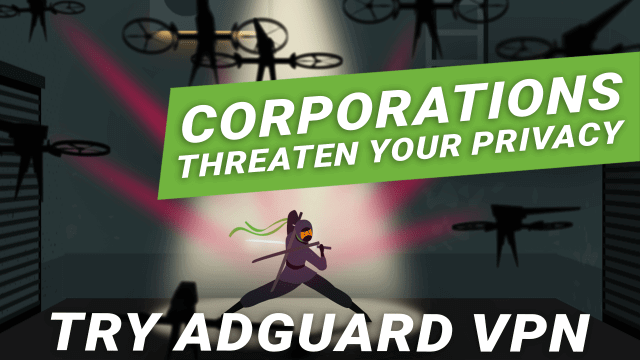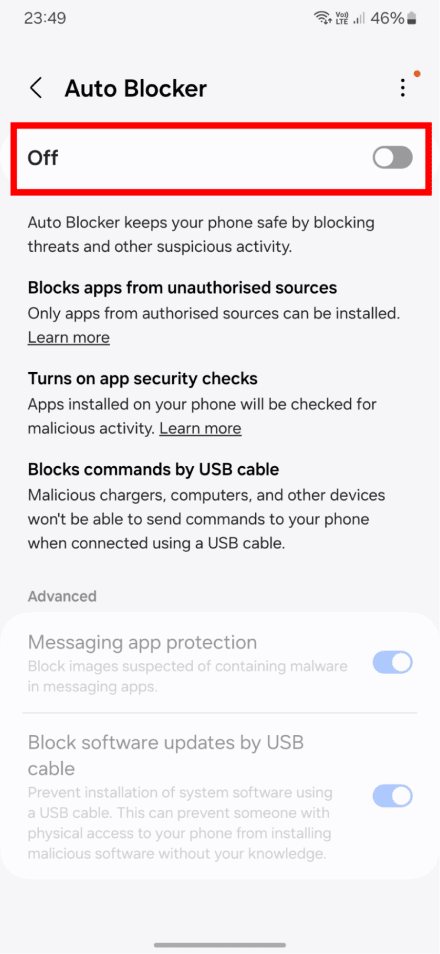Getting a Canadian IP address with a VPN is no big deal. Nonetheless, if you have a specific request, you probably need to be guided through essential VPN features. That’s what we’re here for.
3 reasons to use a Canadian VPN
Advanced encryption
If you live in Canada or have ever visited this country, you probably already know that it has got some of the strictest cybersecurity laws in the Western world. In an effort to keep the country safe and terror-free, its government has grown in legislative power. It has direct and indirect effects on the self-perception of residents and tourists, who may believe that their personal rights to privacy are being violated. A VPN can be a good means of restoring this right.
AdGuard VPN security options include 128- and 256-bit AES encryption, automatic Kill Switch, DNS, IPv4, and IPv6 leak protection, and ‘Block WebRTC’ feature. Now, what’s all this gobbledygook? Read on if you dare to dash through the list of incomprehensible acronyms.
Kill Switch is essential if you value your anonymity. Enable this feature, and if a VPN connection drops for any reason, Kill Switch will block access to the Internet, thus preventing your anonymity from becoming compromised.
DNS, IPv4 and IPv6 leak protection features are present in good VPNs by default. But let’s figure out what these leaks are first. There are two main types of them — IP and DNS leaks.
The worst thing that can happen when using a VPN is an IP leak. If you were deanonymized and your real IP address was found out (this is the leak), the whole point of using a VPN shrinks to nullity.
There are several errors that lead to an IP leak. Try not to make these, and you’ll avoid deanonymization.
1) Incorrect VPN configuration
For instance, your VPN connection is disabled for non-payment. Or you set it up in a way that it does not work on all websites, forgot about it and wrote something extremely accusatory from your real IP address. Now it’s easy to track you down.
What to do? It is difficult to completely exclude the factor of human error, but it is quite possible to protect yourself against a sudden VPN connection drop-out.
Fortunately, AdGuard VPN has the Kill Switch setting mentioned above, which blocks Internet access if the VPN connection was interrupted for some reason.
2) Incorrect VPN usage
Let’s imagine another case. You accidentally opened the page you were hiding from in another browser without a VPN extension, and wrote something there under your username, which you usually hide with a VPN.
What to do? To avoid such situations, it is better to use not an extension, but a system-wide VPN — for example, AdGuard VPN for iOS, macOS, or Windows.
3) Problems on the VPN service side
Sometimes it’s not about you, it’s about your VPN provider. The worst-case scenario (but not rare) is when DNS requests are channeled not through a secure VPN tunnel but through your ISP or public DNS resolver. This is a description of the DNS leak, but more on it later.
4) IP leaks via WebRTC
WebRTC is a cool and powerful technology for decentralized data exchange (for example, video conferences) directly between computers but it has a flip side — on this protocol, data “bypasses the VPN”, which can also reveal your real IP address.
What to do? We recommend that you keep the “Block WebRTC” feature enabled. But please note that it is available only in our ad blocker and VPN browser extensions, not in VPN apps.
Now let us turn to DNS leaks. DNS is a domain name system where you can find the digital addresses of all websites. DNS turns a domain into a numeric address – Internet Protocol, or IP. Browsers use these addresses to find the websites. Here is a simple analogy: the domain name is the name in the contact list, and the IP address is their phone number. People use domain names in alphabetic format but computers only work with numbers that are hard to remember (and there is no need to).
When you open a website in a browser, this is what happens:
1) A request is sent from your computer to the DNS servers of your ISP.
2) The computer receives the IP address of the searched page and establishes a connection, starting to exchange requests and responses.
When you use a VPN, your request should go the roundabout way, to the DNS servers of the VPN service. But poorly configured VPNs do not force DNS traffic to pass through their servers. User data becomes vulnerable because DNS requests go through an ISP or a public resolver (Google, Cloudflare, etc.).
Security and anonymity
VPN hides your IP address when you browse the net. You're given another temporal IP address that’s located on a remote server somewhere far.
Furthermore, you don’t need to worry that your location could be traced when you are using the Internet because your traffic is routed to a remote network through a tunnel.
AdGuard VPN is made by developers of AdGuard ad blocker. Our company was founded in 2009, and since its inception, no logs policy was our top priority. Basically, no logs means that your online activity and personal data remain private. We do not sell or transmit your data to third parties. Using both our VPN and ad blocker, you can be sure that this rule won’t be compromised.
Risk-free browsing and Wi-Fi connection
Now, what you may not know is that ISP providers are not that squeaky clean. Actually, they can easily get access to your sensitive information when you are surfing the web carefree. This raises the question of how to protect oneself. Using a reliable VPN is probably one of the best options. But please note that not every VPN service will guarantee user safety – the bulk of free VPNs don’t follow ‘no logs policies’, collect and store your data and, in theory, might transmit it to third parties at any time.
If we created a handbook for online security, it would start with this rule of thumb: ‘Don’t connect to a public Wi-Fi without a VPN’. No matter where you are, at a cafe or at an airport – using a public Wi-Fi unprotected is a taboo. Well, for one thing, your sensitive data becomes vulnerable. For another thing, it increases the risks of downloading malware or of falling prey to fraud. Anything goes and everything can be used in such circumstances: for an utmost protection, consider using an antivirus solution and anonymity browser.
How to connect to a VPN Canada in 3 steps
On a computer
Step 2. Install AdGuard VPN for Chrome, Firefox, or Edge.
Step 3. Enable VPN in your browser and choose a server located in Canada. Voila!
On a mobile device
Step 2. Install AdGuard VPN for Android or iOS.
Step 3. Click the Connect button and choose a server located in Canada. Voila!















